
中研院民族所圖書館 bsnay M56 30520020558103 D6D The Manchurian Myth Nationalism,Resistance,and Collaboration in Modern China Rana Mitter 屁目 呢骊闲 产 高醫 UNIVERSITY OF CALIFORNIA PRESS Berkeley Los Angeles London t1999>g4e
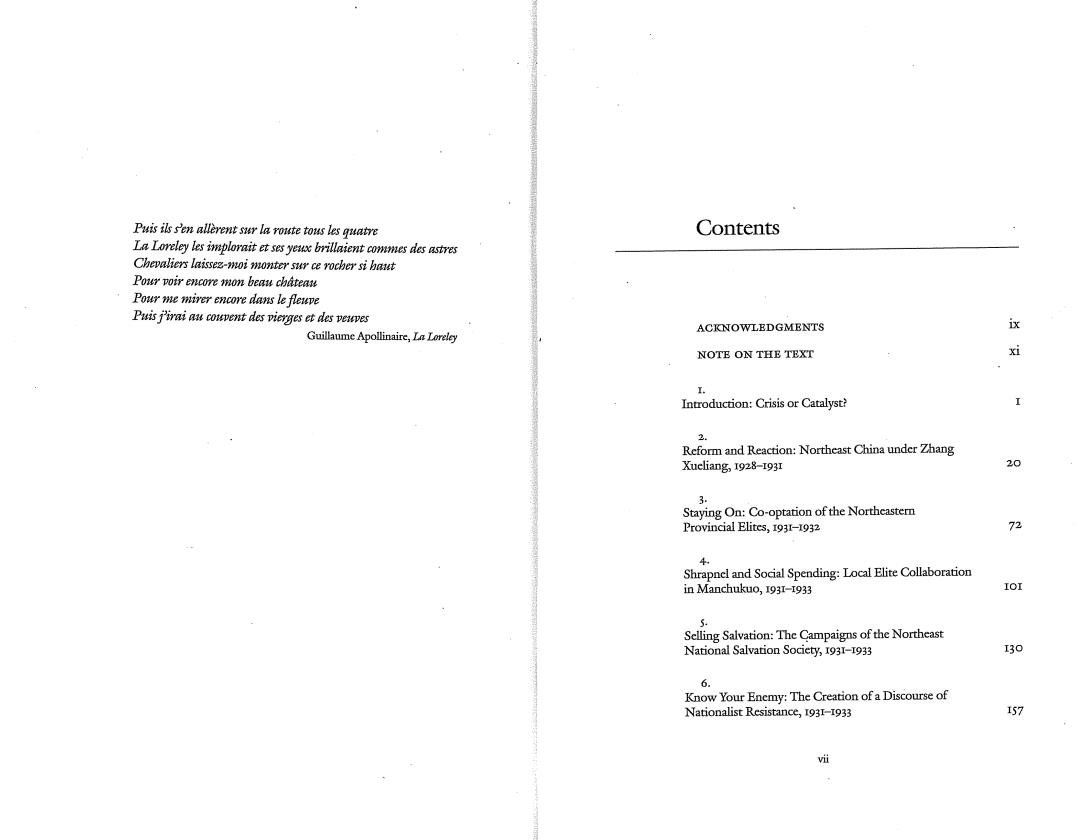
Puis ils s'en allerent sur la roite tous les quatre Contents La Loreley les implorait et ses yeux brillaient commes des astres Chepaliers laissez-moi monter sur ce rocher si haut Pour voir encore mon beau chiteau Pour me mirer encore dans le fleuve Puis pirai au couvent des vierges et des veuves ACKNOWLEDGMENTS Guillaume Apollinaire,La Loreley NOTE ON THE TEXT xi I. Introduction:Crisis or Catalyst? I 2. Reform and Reaction:Northeast China under Zhang Xucliang,I928-1931 20 3. Staying On:Co-optation of the Northeastern Provincial Elites,1931-1932 2 4 Shrapnel and Social Spending:Local Elite Collaboration in Manchukuo,1931-1933 IOI Selling Salvation:The Campaigns of the Northeast National Salvation Society,I931-1933 I30 6. Know Your Enemy:The Creation of a Discourse of Nationalist Resistance,I931-1933 157 vii
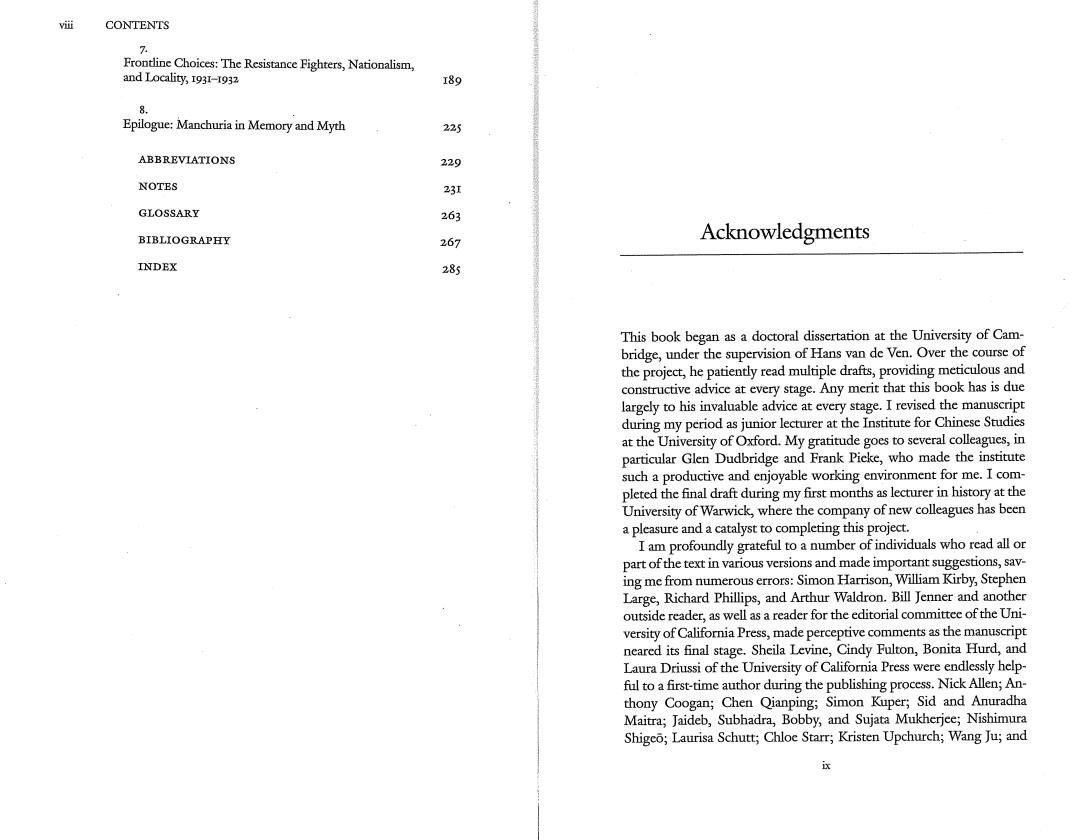
碰 CONTENTS 7. Frontline Choices:The Resistance Fighters,Nationalism, and Locality,1931-1932 I89 8, Epilogue:Manchuria in Memory and Myth 225 ABBREVIATIONS 229 NOTES 231 GLOSSARY 263 BIBLIOGRAPHY 267 Acknowledgments INDEX 285 This book began as a doctoral dissertation at the University of Cam- bridge,under the supervision of Hans van de Ven.Over the course of the project,he patiently read multiple drafts,providing meticulous and constructive advice at every stage.Any merit that this book has is due largely to his invaluable advice at every stage.I revised the manuscript during my period as junior lecturer at the Institute for Chinese Studies at the University of Oxford.My gratitude goes to several colleagues,in particular Glen Dudbridge and Frank Pieke,who made the institute such a productive and enjoyable working environment for me.I com- pleted the final draft during my first months as lecturer in history at the University of Warwick,where the company of new colleagues has been a pleasure and a catalyst to completing this project. I am profoundly grateful to a number of individuals who read all or part of the text in various versions and made important suggestions,sav- ing me from numerous errors:Simon Harrison,William Kirby,Stephen Large,Richard Phillips,and Arthur Waldron.Bill Jenner and another outside reader,as well as a reader for the editorial committee of the Uni- versity of California Press,made perceptive comments as the manuscript neared its final stage.Sheila Levine,Cindy Fulton,Bonita Hurd,and Laura Driussi of the University of California Press were endlessly help- ful to a first-time author during the publishing process.Nick Allen;An- thony Coogan;Chen Qianping;Simon Kuper;Sid and Anuradha Maitra;Jaideb,Subhadra,Bobby,and Sujata Mukherjee;Nishimura Shigeo;Laurisa Schutt;Chloe Starr;Kristen Upchurch;Wang Ju;and ix
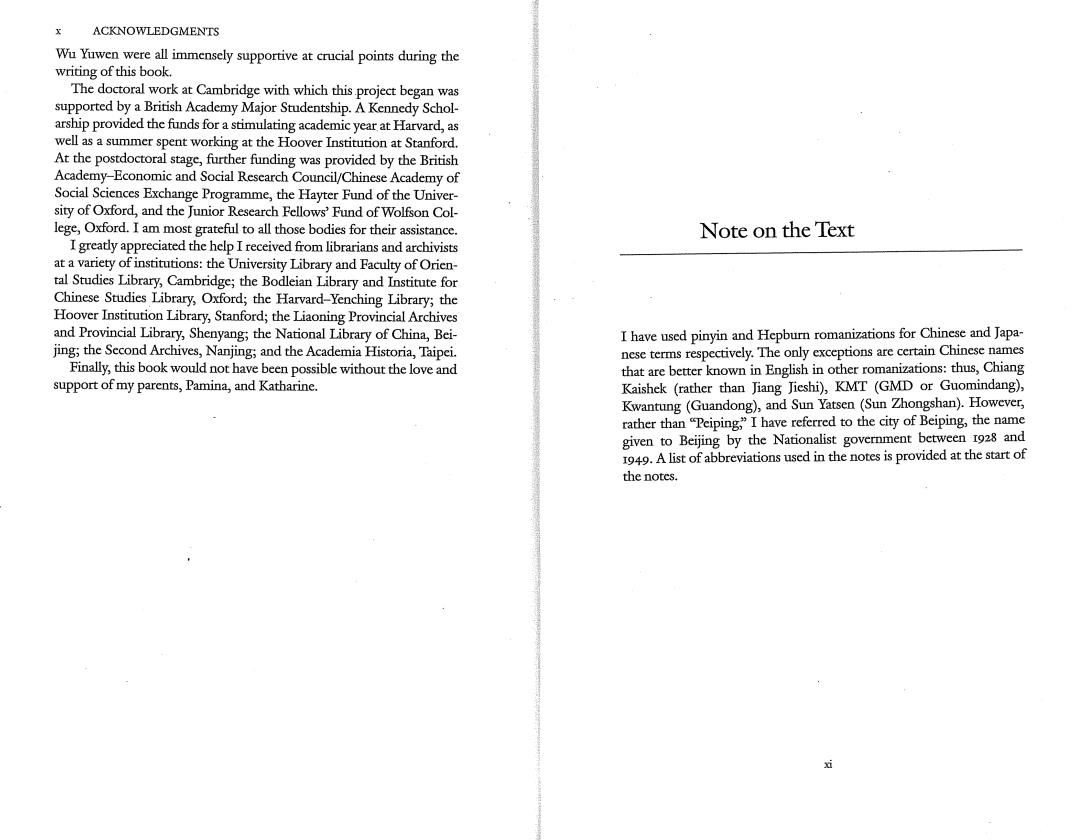
x ACKNOWLEDGMENTS Wu Yuwen were all immensely supportive at crucial points during the writing of this book. The doctoral work at Cambridge with which this project began was supported by a British Academy Major Studentship.A Kennedy Schol- arship provided the funds for a stimulating academic year at Harvard,as well as a summer spent working at the Hoover Institution at Stanford. At the postdoctoral stage,further funding was provided by the British Academy-Economic and Social Research Council/Chinese Academy of Social Sciences Exchange Programme,the Hayter Fund of the Univer- sity of Oxford,and the Junior Research Fellows'Fund of Wolfson Col- lege,Oxford.I am most grateful to all those bodies for their assistance. Note on the Text I greatly appreciated the help I received from librarians and archivists at a variety of institutions:the University Library and Faculty of Orien- tal Studies Library,Cambridge;the Bodleian Library and Institute for Chinese Studies Library,Oxford;the Harvard-Yenching Library;the Hoover Institution Library,Stanford;the Liaoning Provincial Archives and Provincial Library,Shenyang;the National Library of China,Bei- I have used pinyin and Hepburn romanizations for Chinese and Japa- jing;the Second Archives,Nanjing;and the Academia Historia,Taipei. nese terms respectively.The only exceptions are certain Chinese names Finally,this book would not have been possible without the love and that are better known in English in other romanizations:thus,Chiang support of my parents,Pamina,and Katharine. Kaishek (rather than Jiang Jieshi),KMT (GMD or Guomindang), Kwantung (Guandong),and Sun Yatsen(Sun Zhongshan).However, rather than"Peiping,I have referred to the city of Beiping,the name given to Beijing by the Nationalist government between 1928 and 1949.A list of abbreviations used in the notes is provided at the start of the notes
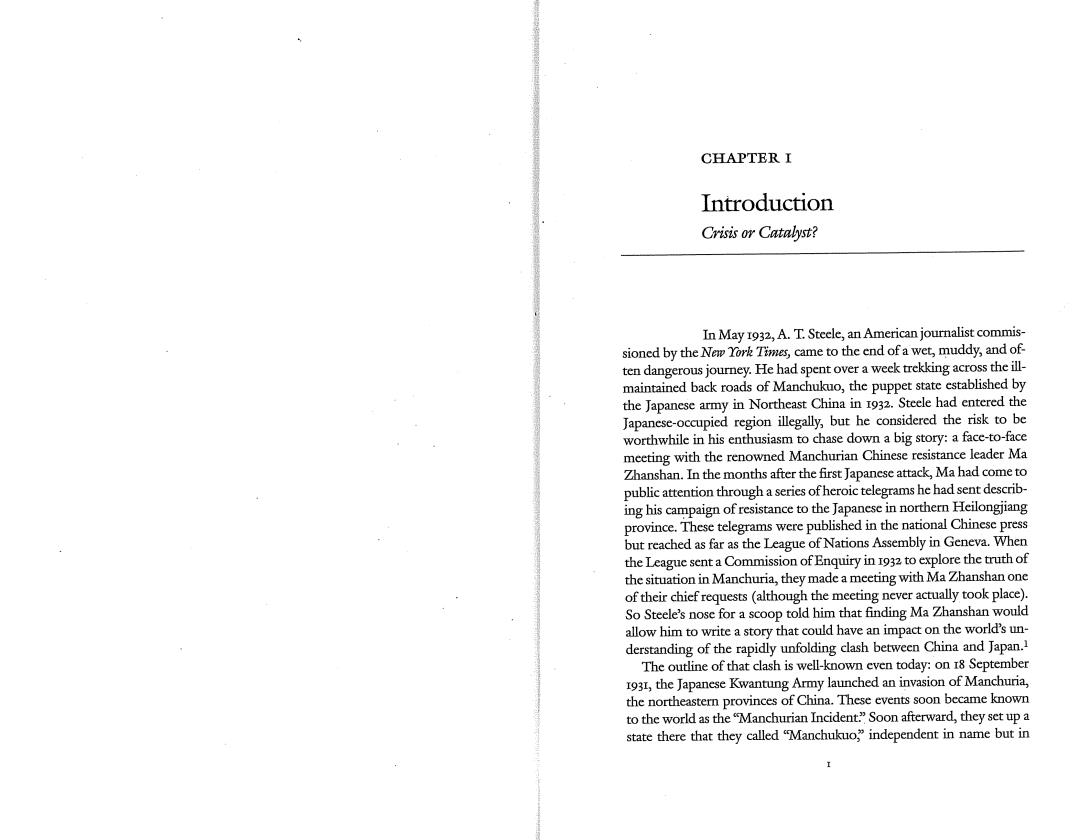
CHAPTER I Introduction Crisis or Catalyst? In May 1932,A.T.Stecle,an American journalist commis- sioned by the New York Times,came to the end of a wet,muddy,and of- ten dangerous journey.He had spent over a week trekking across the ill- maintained back roads of Manchukuo,the puppet state established by the Japanese army in Northeast China in 1932.Steele had entered the Japanese-occupied region illegally,but he considered the risk to be worthwhile in his enthusiasm to chase down a big story:a face-to-face meeting with the renowned Manchurian Chinese resistance leader Ma Zhanshan.In the months after the first Japancse attack,Ma had come to public attention through a series of heroic telegrams he had sent describ- ing his campaign of resistance to the Japanese in northern Heilongjiang province.These telegrams were published in the national Chinese press but reached as far as the League of Nations Assembly in Geneva.When the League sent a Commission of Enquiry in 1932 to explore the truth of the situation in Manchuria,they made a mecting with Ma Zhanshan one of their chief requests(although the meeting never actually took place). So Steele's nose for a scoop told him that finding Ma Zhanshan would allow him to write a story that could have an impact on the world's un- derstanding of the rapidly unfolding clash between China and Japan. The outline of that clash is well-known even today:on 18 September 1931,the Japanese Kwantung Army launched an invasion of Manchuria, the northeastern provinces of China.These events soon became known to the world as the "Manchurian Incident."Soon afterward,they set up a state there that they called "Manchukuo,independent in name but in
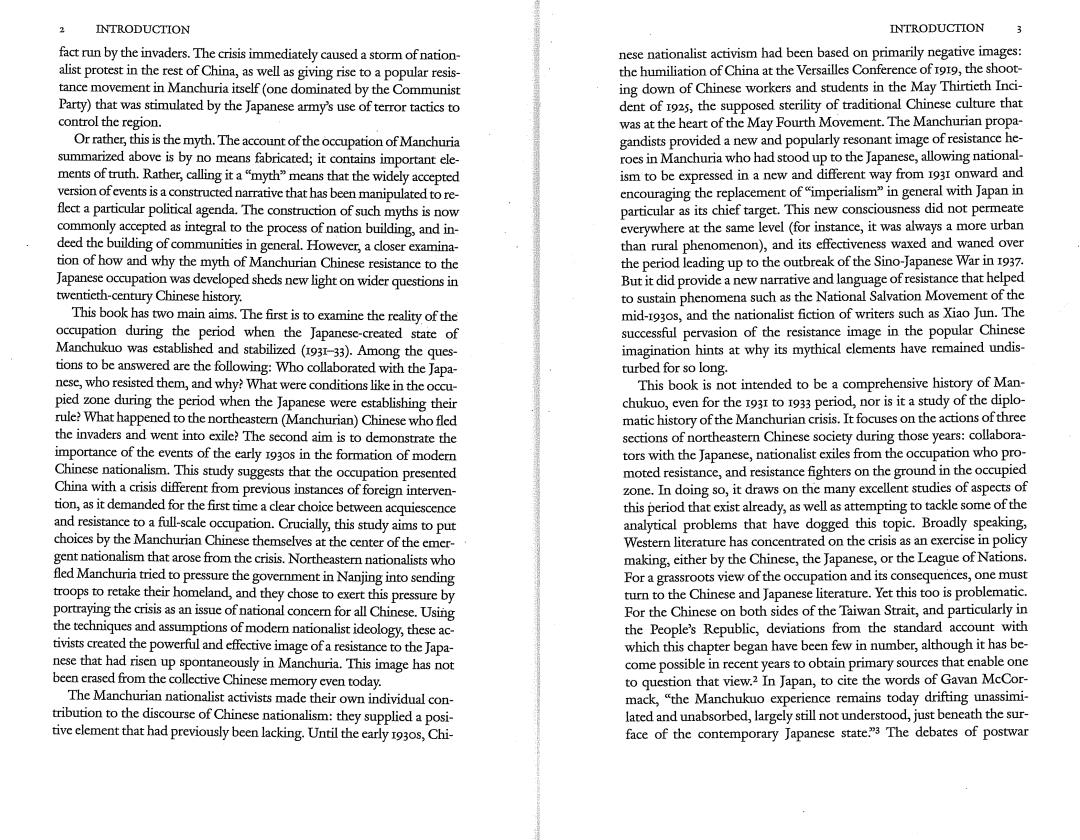
2 INTRODUCTION INTRODUCTION 3 fact run by the invaders.The crisis immediately caused a storm of nation- nese nationalist activism had been based on primarily negative images: alist protest in the rest of China,as well as giving rise to a popular resis- the humiliation of China at the Versailles Conference of r919,the shoot- tance movement in Manchuria itself(one dominated by the Communist ing down of Chinese workers and students in the May Thirticth Inci- Party)that was stimulated by the Japanese army's use of terror tactics to dent of 1925,the supposed sterility of traditional Chinese culture that control the region. was at the heart of the May Fourth Movement.The Manchurian propa- Or rather,this is the myth.The account of the occupation of Manchuria gandists provided a new and popularly resonant image of resistance he- summarized above is by no means fabricated;it contains important ele- roes in Manchuria who had stood up to the Japanese,allowing national- ments of truth.Rather,calling it a"myth"means that the widely accepted ism to be expressed in a new and different way from 193r onward and version ofevents is a constructed narrative that has been manipulated to re- encouraging the replacement of"imperialism in general with Japan in flect a particular political agenda.The construction of such myths is now particular as its chief target.This new consciousness did not permeate commonly accepted as integral to the process of nation building,and in- everywhere at the same level (for instance,it was always a more urban deed the building of communities in general.However,a closer examina- than rural phenomenon),and its effectiveness waxed and waned over tion of how and why the myth of Manchurian Chinese resistance to the the period leading up to the outbreak of the Sino-Japanese War in 1937. Japanese occupation was developed sheds new light on wider questions in But it did provide a new narrative and language of resistance that helped twentieth-century Chinese history. to sustain phenomena such as the National Salvation Movement of the This book has two main aims.The first is to examine the reality of the mid-193os,and the nationalist fiction of writers such as Xiao Jun.The occupation during the period when the Japanese-created state of successful pervasion of the resistance image in the popular Chinese Manchukuo was established and stabilized(1931-33).Among the ques- imagination hints at why its mythical clements have remained undis- tions to be answered are the following:Who collaborated with the Japa- turbed for so long. nese,who resisted them,and why?What were conditions like in the occu- This book is not intended to be a comprehensive history of Man- pied zone during the period when the Japanese were establishing their chukuo,even for the I93r to 1933 period,nor is it a study of the diplo- rule?What happened to the northeastern (Manchurian)Chinese who fled matic history of the Manchurian crisis.It focuses on the actions of three the invaders and went into exile?The second aim is to demonstrate the sections of northeastern Chinese society during those years:collabora- importance of the events of the early 193os in the formation of modern tors with the Japanese,nationalist exiles from the occupation who pro- Chinese nationalism.This study suggests that the occupation presented moted resistance,and resistance fighters on the ground in the occupied China with a crisis different from previous instances of foreign interven- zone.In doing so,it draws on the many excellent studies of aspects of tion,as it demanded for the first time a clear choice between acquiescence this period that exist already,as well as attempting to tackle some of the and resistance to a full-scale occupation.Crucially,this study aims to put analytical problems that have dogged this topic.Broadly speaking, choices by the Manchurian Chinese themselves at the center of the emer- Western literature has concentrated on the crisis as an exercise in policy gent nationalism that arose from the crisis.Northeastern nationalists who making,either by the Chinese,the Japanese,or the League of Nations. fled Manchuria tried to pressure the government in Nanjing into sending For a grassroots view of the occupation and its consequences,one must troops to retake their homeland,and they chose to exert this pressure by turn to the Chinese and Japanese literature.Yet this too is problematic. portraying the crisis as an issue of national concern for all Chinese.Using For the Chinese on both sides of the Taiwan Strait,and particularly in the techniques and assumptions of modern nationalist ideology,these ac- the People's Republic,deviations from the standard account with tivists created the powerful and effective image of a resistance to the Japa- which this chapter began have been few in number,although it has be- nese that had risen up spontaneously in Manchuria.This image has not come possible in recent years to obtain primary sources that enable one been crased from the collective Chinese memory even today. to question that view.2 In Japan,to cite the words of Gavan McCor- The Manchurian nationalist activists made their own individual con- mack,"the Manchukuo experience remains today drifting unassimi- tribution to the discourse of Chinese nationalism:they supplied a posi- lated and unabsorbed,largely still not understood,just beneath the sur- tive element that had previously been lacking.Until the early 193os,Chi- face of the contemporary Japanese state"3 The debates of postwar
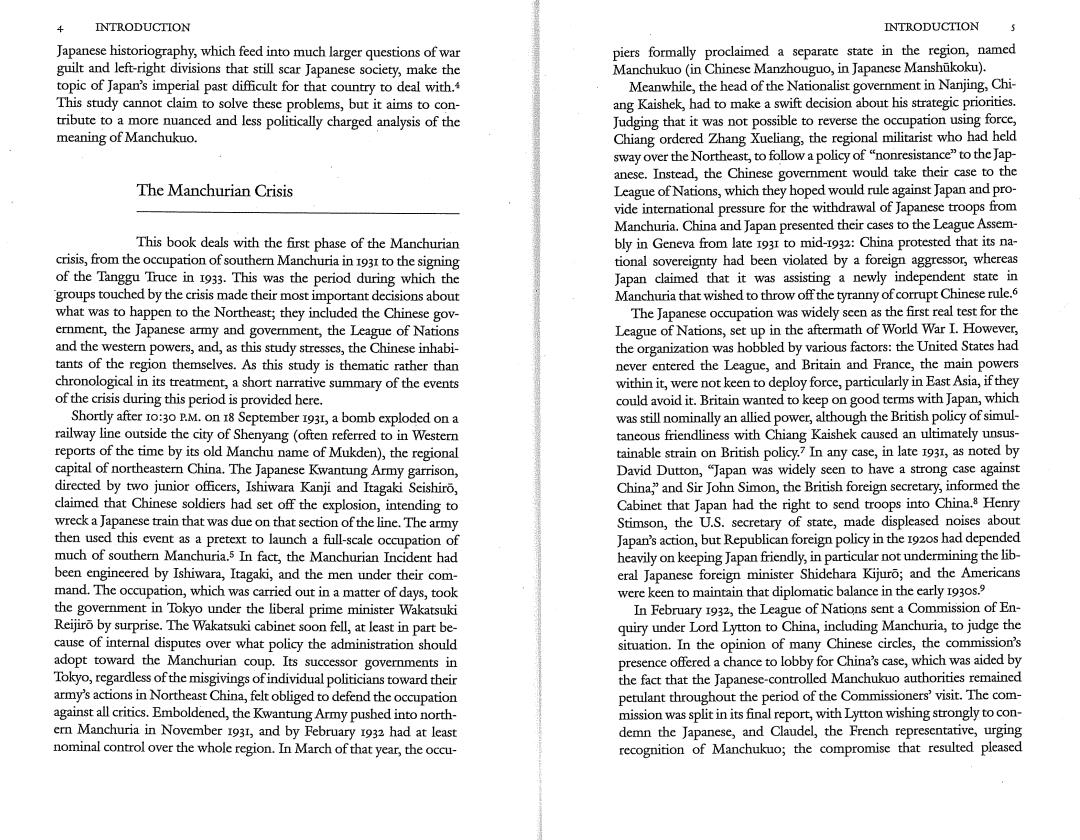
4 INTRODUCTION INTRODUCTION 5 Japanese historiography,which feed into much larger questions of war piers formally proclaimed a separate state in the region,named guilt and left-right divisions that still scar Japanese society,make the Manchukuo (in Chinese Manzhouguo,in Japanese Manshukoku). topic of Japan's imperial past difficult for that country to deal with. Meanwhile,the head of the Nationalist government in Nanjing,Chi- This study cannot claim to solve these problems,but it aims to con- ang Kaishek,had to make a swift decision about his strategic priorities. tribute to a more nuanced and less politically charged analysis of the Judging that it was not possible to reverse the occupation using force, meaning of Manchukuo. Chiang ordered Zhang Xueliang,the regional militarist who had held sway over the Northeast,to follow a policy of "nonresistance"to the Jap- anese.Instead,the Chinese government would take their case to the The Manchurian Crisis League of Nations,which they hoped would rule against Japan and pro- vide international pressure for the withdrawal of Japanese troops from Manchuria.China and Japan presented their cases to the League Assem- This book deals with the first phase of the Manchurian bly in Geneva from late 193I to mid-1932:China protested that its na- crisis,from the occupation of southern Manchuria in 193I to the signing tional sovereignty had been violated by a foreign aggressor,whereas of the Tanggu Truce in 1933.This was the period during which the Japan claimed that it was assisting a newly independent state in groups touched by the crisis made their most important decisions about Manchuria that wished to throw off the tyranny of corrupt Chinese rule.6 what was to happen to the Northeast;they included the Chinese gov- The Japanese occupation was widely seen as the first real test for the ernment,the Japanese army and government,the League of Nations League of Nations,set up in the aftermath of World War I.However, and the western powers,and,as this study stresses,the Chinese inhabi- the organization was hobbled by various factors:the United States had tants of the region themselves.As this study is thematic rather than never entered the League,and Britain and France,the main powers chronological in its treatment,a short narrative summary of the events within it,were not keen to deploy force,particularly in East Asia,if they of the crisis during this period is provided here. could avoid it.Britain wanted to keep on good terms with Japan,which Shortly after Io:30 P.M.on 18 September 1931,a bomb exploded on a was still nominally an allied power,although the British policy of simul- railway line outside the city of Shenyang (often referred to in Western tancous friendliness with Chiang Kaishek caused an ultimately unsus- reports of the time by its old Manchu name of Mukden),the regional tainable strain on British policy.7 In any case,in late 1931,as noted by capital of northeastern China.The Japanese Kwantung Army garrison, David Dutton,"Japan was widely seen to have a strong case against directed by two junior officers,Ishiwara Kanji and Itagaki Seishiro, China,and Sir John Simon,the British foreign secretary,informed the claimed that Chinese soldiers had set off the explosion,intending to Cabinet that Japan had the right to send troops into China.Henry wreck a Japanese train that was due on that section of the line.The army Stimson,the U.S.secretary of state,made displeased noises about then used this event as a pretext to launch a full-scale occupation of Japan's action,but Republican foreign policy in the I9os had depended much of southern Manchuria.5 In fact,the Manchurian Incident had heavily on keeping Japan friendly,in particular not undermining the lib- been engineered by Ishiwara,Itagaki,and the men under their com- eral Japanese foreign minister Shidchara Kijuro;and the Americans mand.The occupation,which was carried out in a matter of days,took were keen to maintain that diplomatic balance in the early 193os. the government in Tokyo under the liberal prime minister Wakatsuki In February 1932,the League of Nations sent a Commission of En- Reijiro by surprise.The Wakatsuki cabinet soon fell,at least in part be- quiry under Lord Lytton to China,including Manchuria,to judge the cause of internal disputes over what policy the administration should situation.In the opinion of many Chinese circles,the commission's adopt toward the Manchurian coup.Its successor governments in presence offered a chance to lobby for China's case,which was aided by Tokyo,regardless of the misgivings of individual politicians toward their the fact that the Japanese-controlled Manchukuo authorities remained army's actions in Northeast China,felt obliged to defend the occupation petulant throughout the period of the Commissioners'visit.The com- against all critics.Emboldened,the Kwantung Army pushed into north- mission was split in its final report,with Lytton wishing strongly to con- ern Manchuria in November 1931,and by February 1932 had at least demn the Japanese,and Claudel,the French representative,urging nominal control over the whole region.In March of that year,the occu- recognition of Manchukuo;the compromise that resulted pleased
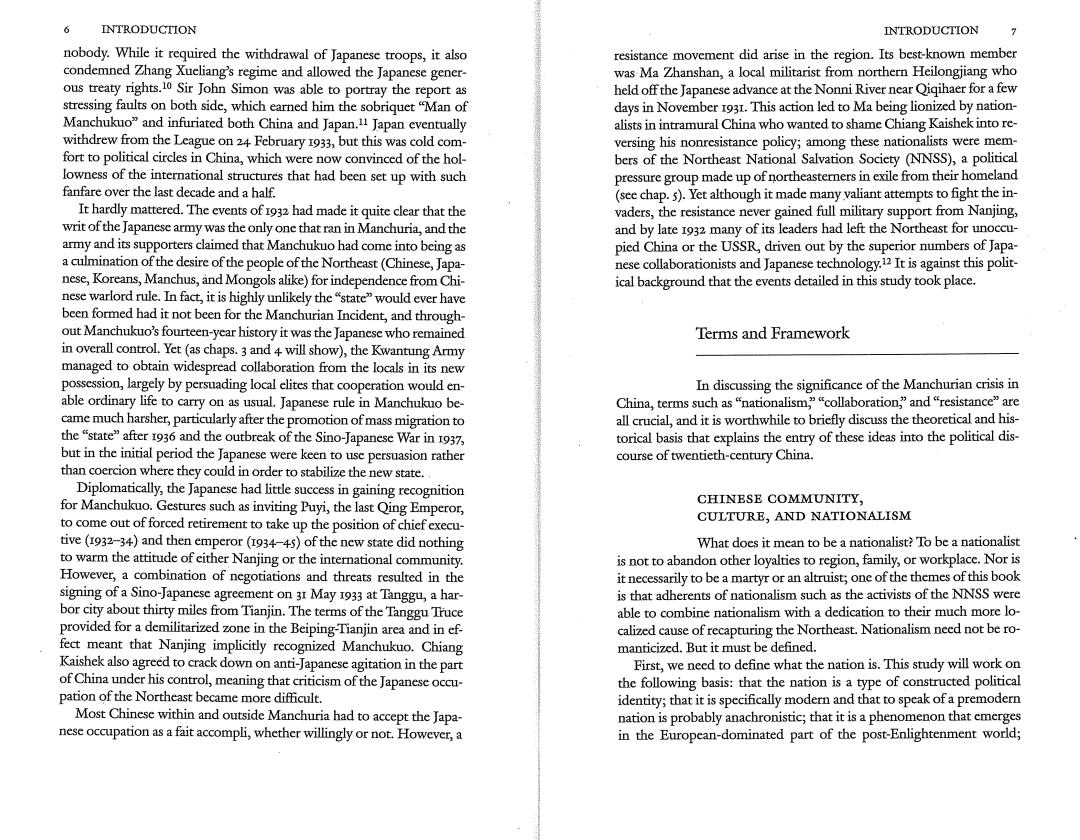
6 INTRODUCTION INTRODUCTION nobody.While it required the withdrawal of Japanese troops,it also resistance movement did arise in the region.Its best-known member condemned Zhang Xucliang's regime and allowed the Japanese gener- was Ma Zhanshan,a local militarist from northern Heilongjiang who ous treaty rights.10 Sir John Simon was able to portray the report as held off the Japanese advance at the Nonni River near Qigihaer for a few stressing faults on both side,which earned him the sobriquet "Man of days in November 1931.This action led to Ma being lionized by nation- Manchukuo"and infuriated both China and Japan.11 Japan eventually alists in intramural China who wanted to shame Chiang Kaishek into re- withdrew from the League on 24 February 1933,but this was cold com- versing his nonresistance policy;among these nationalists were mem- fort to political circles in China,which were now convinced of the hol- bers of the Northeast National Salvation Socicty (NNSS),a political lowness of the international structures that had been set up with such pressure group made up of northeasterners in exile from their homeland fanfare over the last decade and a half. (see chap.5).Yet although it made many valiant attempts to fight the in- It hardly mattered.The events of 1932 had made it quite clear that the vaders,the resistance never gained full military support from Nanjing, writ of the Japanesc army was the only one that ran in Manchuria,and the and by late 1932 many of its leaders had left the Northeast for unoccu- army and its supporters claimed that Manchukuo had come into being as pied China or the USSR,driven out by the superior numbers of Japa- a culmination of the desire of the people of the Northeast(Chinese,Japa- nese collaborationists and Japanese technology.12 It is against this polit- nese,Koreans,Manchus,and Mongols alike)for independence from Chi- ical background that the events detailed in this study took place. nese warlord rule.In fact,it is highly unlikely the "state"would ever have been formed had it not been for the Manchurian Incident,and through- out Manchukuo's fourteen-year history it was the Japancse who remained Terms and Framework in overall control.Yet (as chaps.3 and 4 will show),the Kwantung Army managed to obtain widespread collaboration from the locals in its new possession,largely by persuading local elites that cooperation would en- In discussing the significance of the Manchurian crisis in able ordinary life to carry on as usual.Japanese rule in Manchukuo be- China,terms such as“nationalism,”collaboration,”and“resistance”are came much harsher,particularly after the promotion of mass migration to all crucial,and it is worthwhile to briefly discuss the theoretical and his- the "state"after 1936 and the outbreak of the Sino-Japanese War in 1937, torical basis that explains the entry of these ideas into the political dis- but in the initial period the Japanese were keen to use persuasion rather course of twentieth-century China. than coercion where they could in order to stabilize the new state. Diplomatically,the Japanese had little success in gaining recognition for Manchukuo.Gestures such as inviting Puyi,the last Qing Emperor, CHINESE COMMUNITY, to come out of forced retirement to take up the position of chief execu- CULTURE,AND NATIONALISM tive(1932-34)and then emperor(1934-45)of the new state did nothing What does it mean to be a nationalist?To be a nationalist to warm the attitude of either Nanjing or the international community. is not to abandon other loyalties to region,family,or workplace.Nor is However,a combination of negotiations and threats resulted in the it necessarily to be a martyr or an altruist;one of the themes of this book signing of a Sino-Japanese agreement on 3r May 1933 at Tanggu,a har- is that adherents of nationalism such as the activists of the NNSS were bor city about thirty miles from Tianjin.The terms of the Tanggu Truce able to combine nationalism with a dedication to their much more lo- provided for a demilitarized zone in the Beiping-Tianjin area and in ef- calized cause of recapturing the Northeast.Nationalism need not be ro- fect meant that Nanjing implicitly recognized Manchukuo.Chiang manticized.But it must be defined. Kaishek also agreed to crack down on anti-Japanese agitation in the part First,we need to define what the nation is.This study will work on of China under his control,meaning that criticism of the Japanese occu- the following basis:that the nation is a type of constructed political pation of the Northeast became more difficult. identity;that it is specifically modern and that to speak of a premodern Most Chinese within and outside Manchuria had to accept the Japa- nation is probably anachronistic;that it is a phenomenon that emerges nese occupation as a fait accompli,whether willingly or not.However,a in the European-dominated part of the post-Enlightenment world;
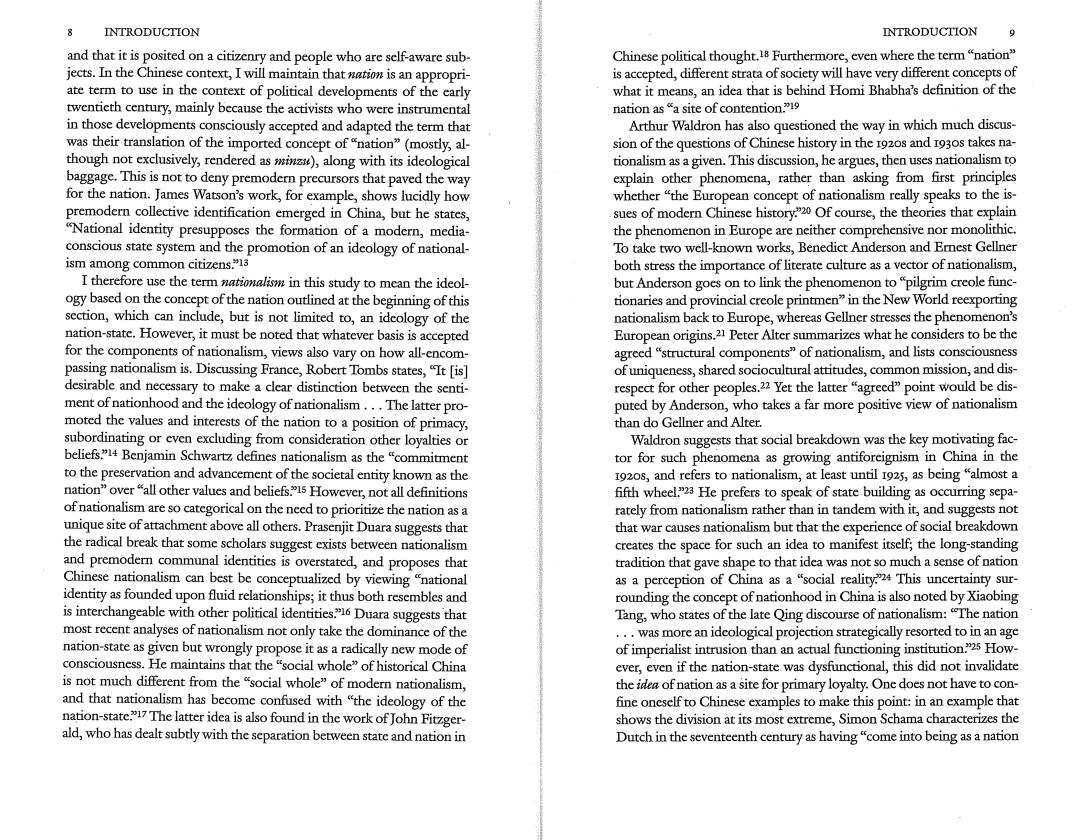
INTRODUCTION INTRODUCTION 9 and that it is posited on a citizenry and people who are self-aware sub- Chinese political thought.18 Furthermore,even where the term"nation" jects.In the Chinese context,I will maintain that matio is an appropri- is accepted,different strata of society will have very different concepts of ate term to use in the context of political developments of the early what it means,an idea that is behind Homi Bhabha's definition of the twenticth century,mainly because the activists who were instrumental nation as "a site of contention.9 in those developments consciously accepted and adapted the term that Arthur Waldron has also questioned the way in which much discus- was their translation of the imported concept of "nation"(mostly,al- sion of the questions of Chinese history in the rzos and 193os takes na- though not exclusively,rendered as),along with its ideological tionalism as a given.This discussion,he argues,then uses nationalism to baggage.This is not to deny premodern precursors that paved the way explain other phenomena,rather than asking from first principles for the nation.James Watson's work,for example,shows lucidly how whether "the European concept of nationalism really speaks to the is- premodern collective identification emerged in China,but he states, sues of modern Chinese history"20 Of course,the theories that explain "National identity presupposes the formation of a modern,media- the phenomenon in Europe are neither comprehensive nor monolithic. conscious state system and the promotion of an idcology of national- To take two well-known works,Benedict Anderson and Ernest Gellner ism among common citizens."13 both stress the importance of literate culture as a vector of nationalism, I therefore use the term nationalis in this study to mean the ideol- but Anderson goes on to link the phenomenon to "pilgrim creole func- ogy based on the concept of the nation outlined at the beginning of this tionaries and provincial creole printmen"in the New World reexporting section,which can include,but is not limited to,an ideology of the nationalism back to Europe,whereas Gellner stresses the phenomenon's nation-state.However,it must be noted that whatever basis is accepted European origins.21 Peter Alter summarizes what he considers to be the for the components of nationalism,views also vary on how all-encom- agreed "structural components"of nationalism,and lists consciousness passing nationalism is.Discussing France,Robert Tombs states,"It [is] of uniqueness,shared sociocultural attitudes,common mission,and dis- desirable and necessary to make a clear distinction between the senti- respect for other peoples.22 Yet the latter "agreed"point would be dis- ment of nationhood and the ideology of nationalism...The latter pro- puted by Anderson,who takes a far more positive view of nationalism moted the values and interests of the nation to a position of primacy, than do Gellner and Alter. subordinating or even excluding from consideration other loyalties or Waldron suggests that social breakdown was the key motivating fac- beliefs:14 Benjamin Schwartz defines nationalism as the "commitment tor for such phenomena as growing antiforeignism in China in the to the preservation and advancement of the societal entity known as the I920s,and refers to nationalism,at least until 1925,as being"almost a nation"over"all other values and beliefs.15 However,not all definitions fifth wheel.23 He prefers to speak of state building as occurring sepa- of nationalism are so categorical on the need to prioritize the nation as a rately from nationalism rather than in tandem with it,and suggests not unique site of attachment above all others.Prasenjit Duara suggests that that war causes nationalism but that the experience of social breakdown the radical break that some scholars suggest exists between nationalism creates the space for such an idea to manifest itself;the long-standing and premodern communal identities is overstated,and proposes that tradition that gave shape to that idea was not so much a sense of nation Chinese nationalism can best be conceptualized by viewing "national as a perception of China as a "social reality.24 This uncertainty sur- identity as founded upon fluid relationships;it thus both resembles and rounding the concept of nationhood in China is also noted by Xiaobing is interchangeable with other political identities6 Duara suggests that Tang,who states of the late Qing discourse of nationalism:"The nation most recent analyses of nationalism not only take the dominance of the ..was more an ideological projection strategically resorted to in an age nation-state as given but wrongly propose it as a radically new mode of of imperialist intrusion than an actual functioning institution"25 How- consciousness.He maintains that the"social whole"of historical China ever,even if the nation-state was dysfunctional,this did not invalidate is not much different from the "social whole"of modern nationalism, the idea of nation as a site for primary loyalty.One does not have to con- and that nationalism has become confused with "the ideology of the fine oneself to Chinese examples to make this point:in an example that nation-state.17 The latter idea is also found in the work of John Fitzger- shows the division at its most extreme,Simon Schama characterizes the ald,who has dealt subtly with the separation between state and nation in Dutch in the seventeenth century as having"come into being as a nation
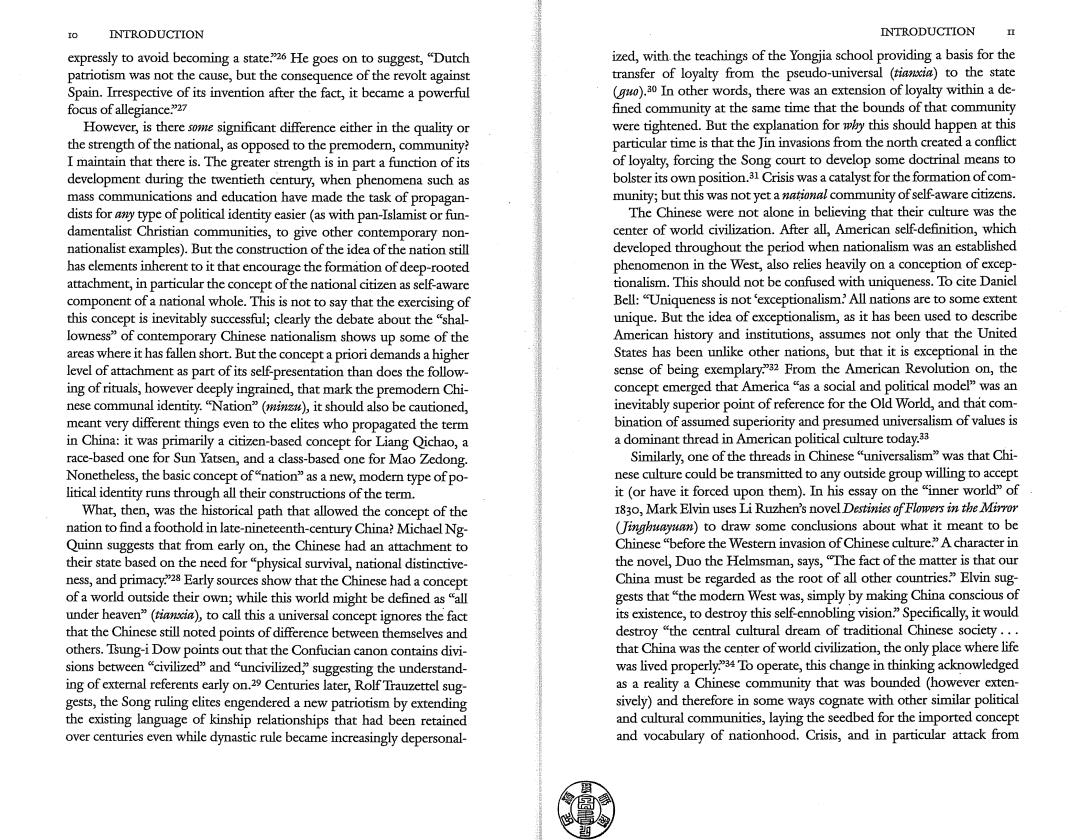
0 INTRODUCTION INTRODUCTION expressly to avoid becoming a state26 He goes on to suggest,"Dutch ized,with the teachings of the Yongjia school providing a basis for the patriotism was not the cause,but the consequence of the revolt against transfer of loyalty from the pseudo-universal (tiaxi)to the state Spain.Irrespective of its invention after the fact,it became a powerful (guo).30 In other words,there was an extension of loyalty within a de- focus of allegiance.27 fined community at the same time that the bounds of that community However,is there some significant difference either in the quality or were tightened.But the explanation for why this should happen at this the strength of the national,as opposed to the premodern,community? particular time is that the Jin invasions from the north created a conflict I maintain that there is.The greater strength is in part a function of its of loyalty,forcing the Song court to develop some doctrinal means to development during the twentieth century,when phenomena such as bolster its own position.3 Crisis was a catalyst for the formation of com- mass communications and education have made the task of propagan- munity;but this was not yet a mationcommunity of self-aware citizens. dists for y type of political identity easier(as with pan-Islamist or fun- The Chinese were not alone in believing that their culture was the damentalist Christian communities,to give other contemporary non- center of world civilization.After all,American self-definition,which nationalist examples).But the construction of the idea of the nation still developed throughout the period when nationalism was an established has clements inherent to it that encourage the formation of deep-rooted phenomenon in the West,also relies heavily on a conception of excep- attachment,in particular the concept of the national citizen as self-aware tionalism.This should not be confused with uniqueness.To cite Daniel component of a national whole.This is not to say that the exercising of Bell:"Uniqueness is not 'exceptionalism?All nations are to some extent this concept is inevitably successful;clearly the debate about the "shal- unique.But the idea of exceptionalism,as it has been used to describe lowness"of contemporary Chinese nationalism shows up some of the American history and institutions,assumes not only that the United areas where it has fallen short.But the concept a priori demands a higher States has been unlike other nations,but that it is exceptional in the level of attachment as part of its self-presentation than does the follow- sense of being exemplary.32 From the American Revolution on,the ing of rituals,however deeply ingrained,that mark the premodern Chi- concept emerged that America "as a social and political model"was an nese communal identity."Nation"(),it should also be cautioned, inevitably superior point of reference for the Old World,and that com- meant very different things even to the elites who propagated the term bination of assumed superiority and presumed universalism of values is in China:it was primarily a citizen-based concept for Liang Qichao,a a dominant thread in American political culture today.33 race-based one for Sun Yatsen,and a class-based one for Mao Zedong. Similarly,one of the threads in Chinese"universalism was that Chi- Nonetheless,the basic concept of "nation"as a new,modern type of po- nese culture could be transmitted to any outside group willing to accept litical identity runs through all their constructions of the term. it (or have it forced upon them).In his essay on the "inner world of What,then,was the historical path that allowed the concept of the 1830,Mark Elvin uses Li Ruzhen's novel Destinies of Flowers in the Mirror nation to find a foothold in late-nineteenth-century China?Michael Ng- (Jinghuayan)to draw some conclusions about what it meant to be Quinn suggests that from early on,the Chinese had an attachment to Chinese "before the Western invasion of Chinese culture."A character in their state based on the need for"physical survival,national distinctive- the novel,Duo the Helmsman,says,"The fact of the matter is that our ness,and primacy."28 Early sources show that the Chinese had a concept China must be regarded as the root of all other countries."Elvin sug- of a world outside their own;while this world might be defined as "all gests that"the modern West was,simply by making China conscious of under heaven(tiancia),to call this a universal concept ignores the fact its existence,to destroy this self-ennobling vision."Specifically,it would that the Chinese still noted points of difference between themselves and destroy "the central cultural dream of traditional Chinese society... others.Tsung-i Dow points out that the Confucian canon contains divi- that China was the center of world civilization,the only place where life sions between "civilized"and"uncivilized"suggesting the understand- was lived properly To operate,this change in thinking acknowledged ing of external referents early on.29 Centuries later,Rolf Trauzettel sug- as a reality a Chinese community that was bounded (however exten- gests,the Song ruling elites engendered a new patriotism by extending sively)and therefore in some ways cognate with other similar political the existing language of kinship relationships that had been retained and cultural communities,laying the seedbed for the imported concept over centuries even while dynastic rule became increasingly depersonal- and vocabulary of nationhood.Crisis,and in particular attack from